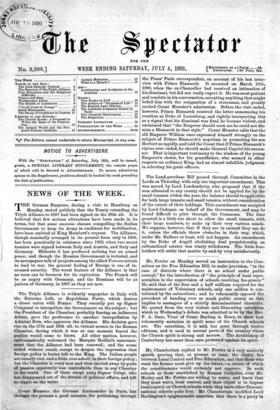Count Munster, the German Ambassador in Paris, has thought the
present a good occasion for publishing, through
the Times' Paris correspondent, an account of his last inter- view with Prince Bismarck. It occurred on March 19th,, 1890, when the ex-Chancellor had received an intimation of his dismissal, but did not really expect it. He was most patient and resolute in his conversation, accepting anything that might befall him with the resignation of a statesman, and greatly excited Count Munster's admiration. Before the visit ended, however, Prince Bismarck received the letter announcing his creation as Duke of Lauenburg, and rightly interpreting this as a signal that his dismissal was final, he became violent, and exclaimed that "the Emperor should soon see he could not dis- miss a Bismarck in that style." Count Munster adds that the old Emperor William once expressed himself strongly on the subject of Prince Bismarck's nepotism in promoting his son Herbert so rapidly, and told the Count that if Prince Bismarck's regime ever ended, he should make General Caprivi his succes- sor. That is important testimony to the wisdom of the young Emperor's choice, for his grandfather, who seemed in other respects an ordinary King, had an almost infallible judgment in selecting his great officers.










































 Previous page
Previous page